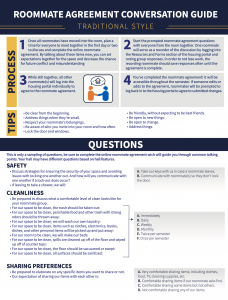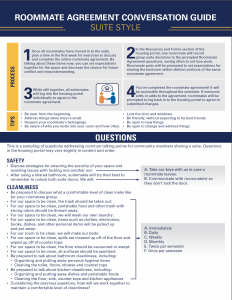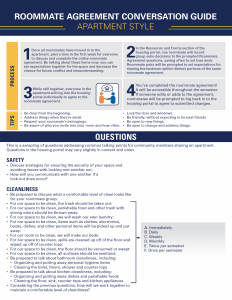Roommate success guide – living together
Communication is key
Open and ongoing communication is critical to establishing and maintaining a positive and successful roommate relationship. Completing a roommate agreement together and practicing effective communication techniques will build the foundation for a respectful and enjoyable experience.
Roommate agreement Accordion Closed
Overview
The roommate agreement process initiates communication, establishes shared living expectations and responsibilities, and provides a great foundation for roommate satisfaction. Complete or access your roommate agreement in the Resources and Forms section of the Housing Portal each semester you are living on campus.
Your Community Assistant (CA) will talk about the roommate agreement process at the first floor meeting. They will also follow up with you and your roommate(s) to help reinforce the ideas and “room rules” that you put into place.
Process
- Once all roommates have moved into the unit, plan a time in the first week for everyone to discuss and complete the online roommate agreement. By discussing these items now, you can set expectations together for the room and decrease the chance for future conflict and misunderstanding.
- In the Resources and Forms section of the Housing Portal, one roommate will record group decisions to the prompted Roommate Agreement questions, saving often to prevent losing work.
- For those in a suite or apartment, roommate pairs will be prompted to set expectations for sharing the bedroom within distinct portions of the same roommate agreement.
- While still together, all people in the unit will log in to the Housing Portal individually to finalize and agree to the roommate agreement.
- The completed roommate agreement will be accessible throughout the semester. If agreement edits or additions are needed, roommates will be prompted to log back in to the housing portal to agree to submitted changes. If a new roommate group is formed, a new roommate agreement should be established.
Tips for effective communication Accordion Closed
- Be clear from the beginning. Do you already know that it bothers you when someone hits the snooze button several times? That you’re a neat freak? That you need ten minutes to yourself before talking to anyone when you first wake up? Let your roommate know as soon as you can about your little quirks and preferences. It’s unrealistic to expect your roommate to read your mind, and communicating what you need is one of the best ways to prevent conflict.
- Address things when they’re small. Has your roommate eaten your last package of ramen noodles? Does his typing late at night keep you awake? Addressing things that bug you while they’re still small can help your roommate be aware of something she may not otherwise know. Addressing little things is much easier than addressing them after they’ve become big issues.
- Respect your roommate’s belongings. This may seem simple, but it’s typically one of the reasons roommates experience conflict. Don’t think he’ll mind if you borrow his headphones? Her clothes? Talk through what is okay to share or borrow, and what is off-limits. Don’t assume that because your roommate told you it was okay to use his laptop that you can use his bike. Also, talk about how often it’s okay to use something—borrowing something once in a while is different than every day.
- Be aware of who you invite into your room and how often. You may love having your study group use your room, but your roommate may not. Be mindful of how often you bring people over. If your roommate studies best when it’s quiet and you study best in a group, alternate who heads to the library and who uses the room.
- Lock the door and windows. This may seem like it has nothing to do with roommate relationships, but how would you feel if your roommate’s laptop got stolen during the ten seconds it took you to run down the hall? Or vice versa? Locking your door and windows is a critical part of staying safe on campus.
- Be friendly, without expecting to be best friends. Successful roommate relationships are not dependent on friendship. While a great friendship may or may not develop, be careful not to expect that you are going to be best friends for the time you’re in college. Expecting or depending on it sets both of you up for misunderstanding or disappointment. You should be friendly with your roommate, but also make sure you have your own social circles.
- Be open to new things. Your roommate may be from someplace you’ve never heard of before or may have a completely different religion or lifestyle from your own. Be open to new ideas and experiences. That’s why you went to college in the first place!
- Be open to change. You should expect to learn and grow during your time at school, and so should your roommate. As the semester progresses, realize things will change for both of you. Be comfortable addressing things that unexpectedly come up, setting new rules, and being flexible to your changing environment.
- Address things when they’re big. You may not have been totally honest with tip #2. Or you may suddenly find yourself with a roommate who goes wild after being shy and quiet for the first two months. Either way, if something becomes a big problem, address it quickly so it doesn’t become worse.
- Try on some new shoes. Before making assumptions, try to step back and think about what your roommate’s perspective may be in a situation. Then ask your roommate and LISTEN. You may not agree, but it will help to open your mind to different opinions and experiences.


